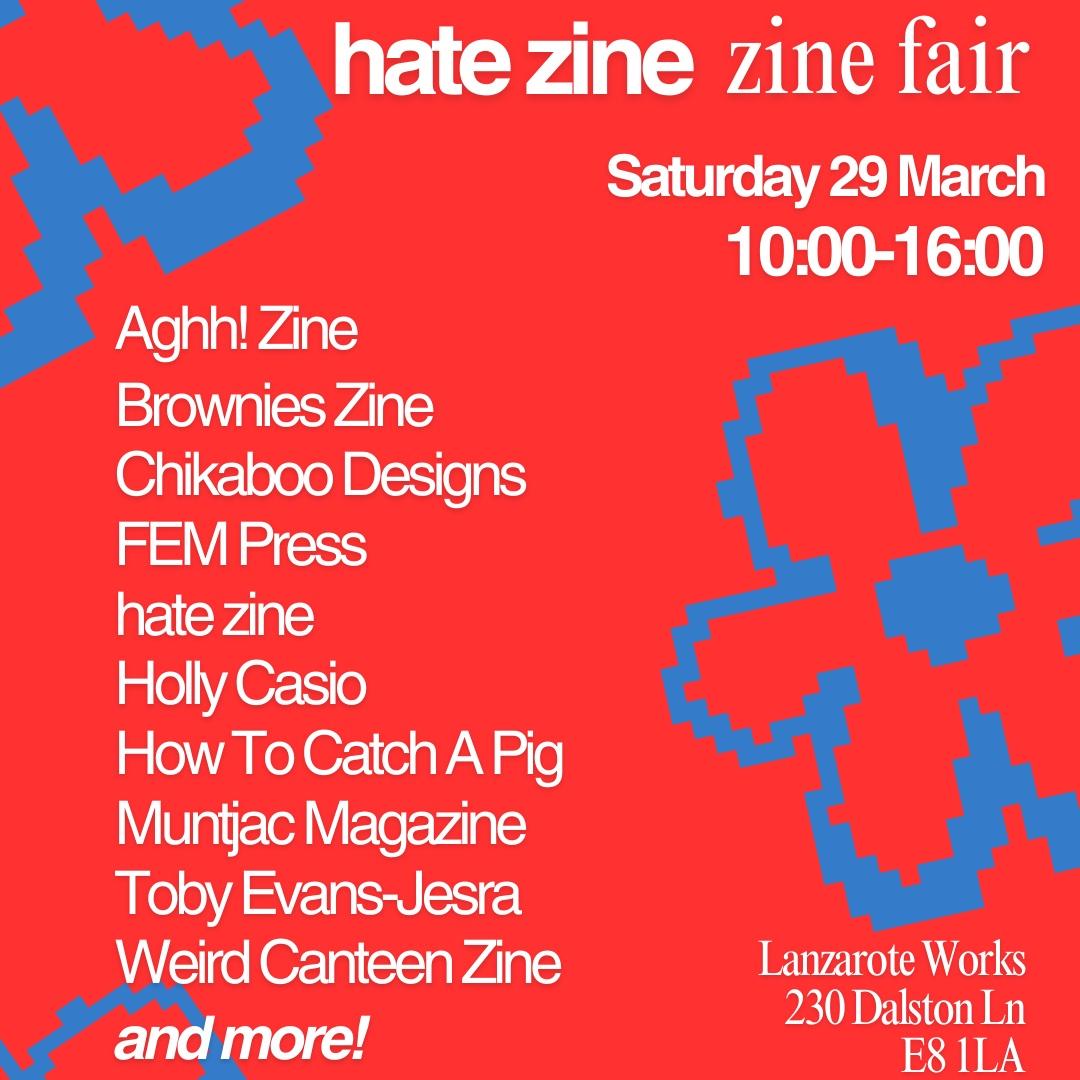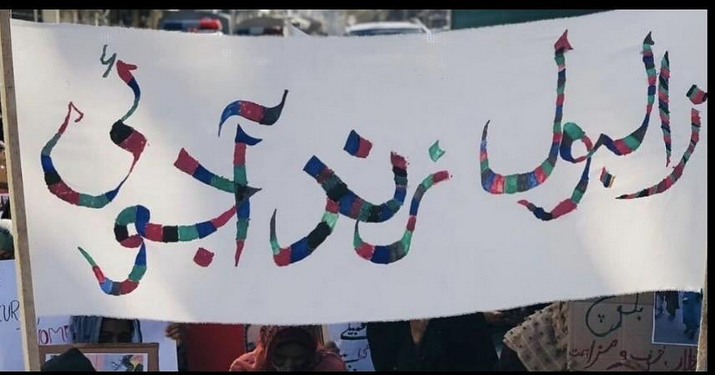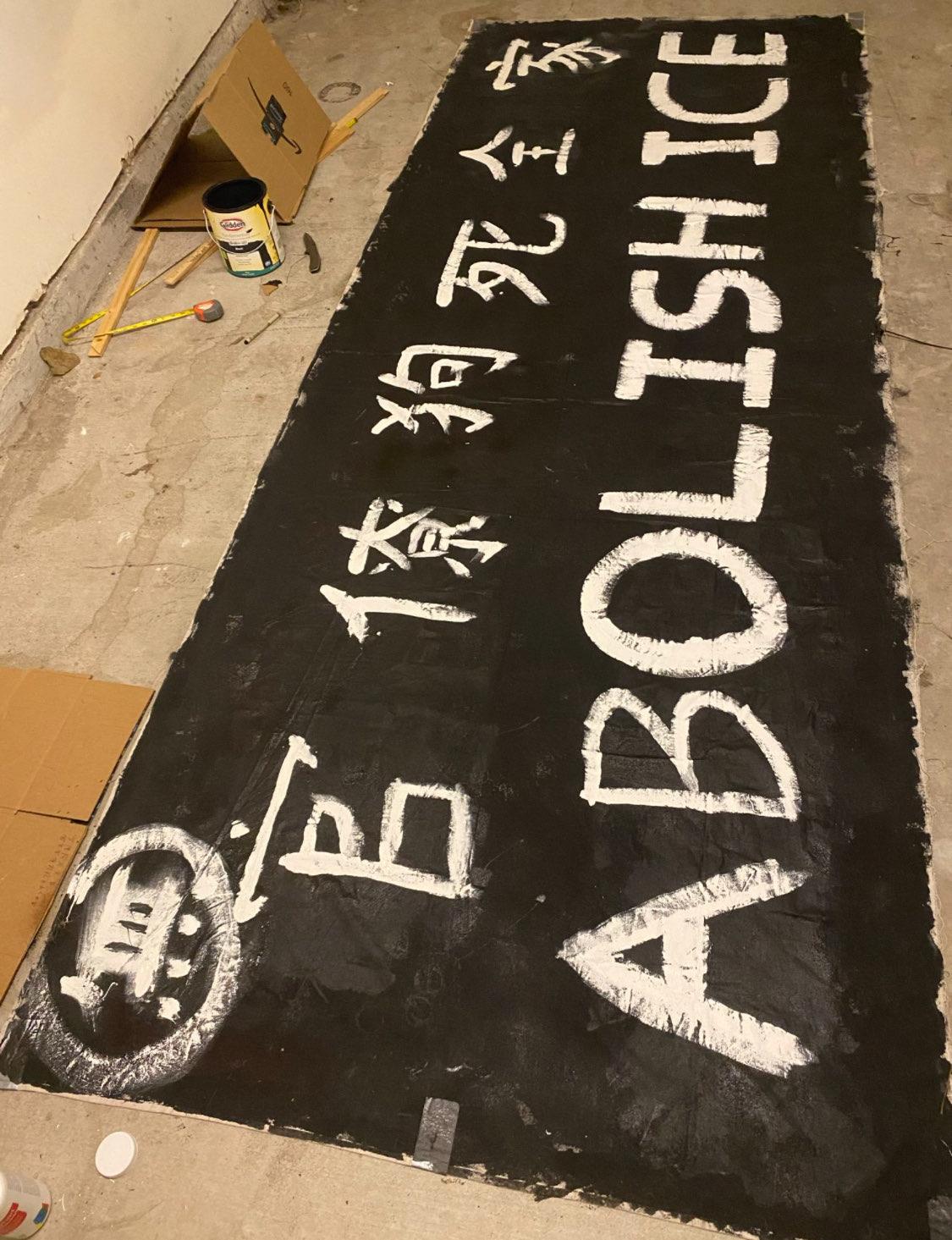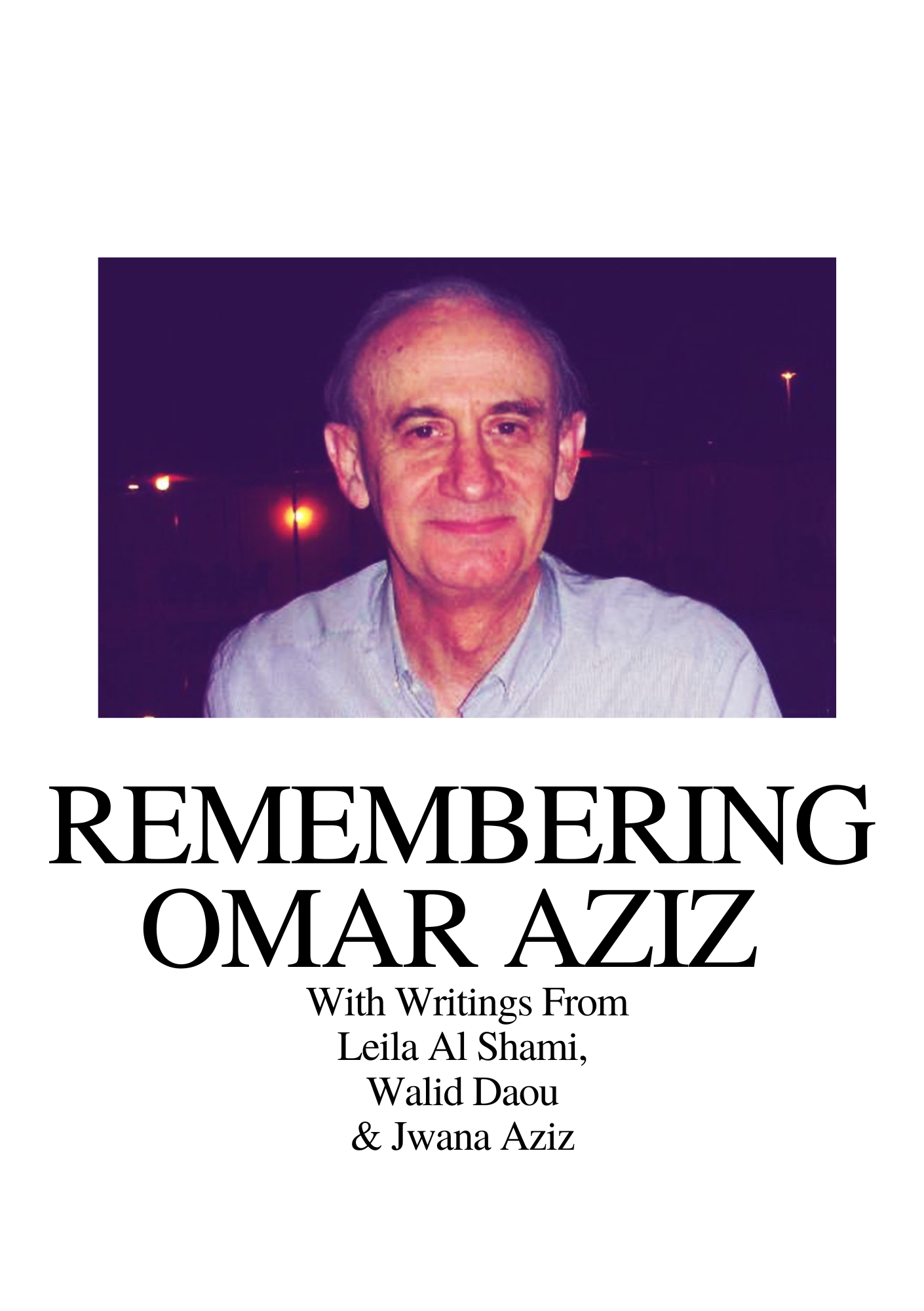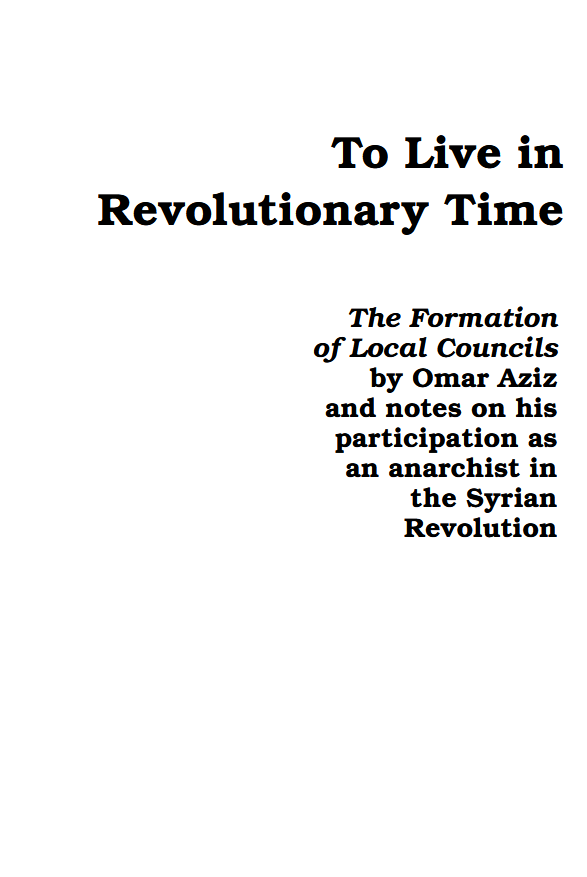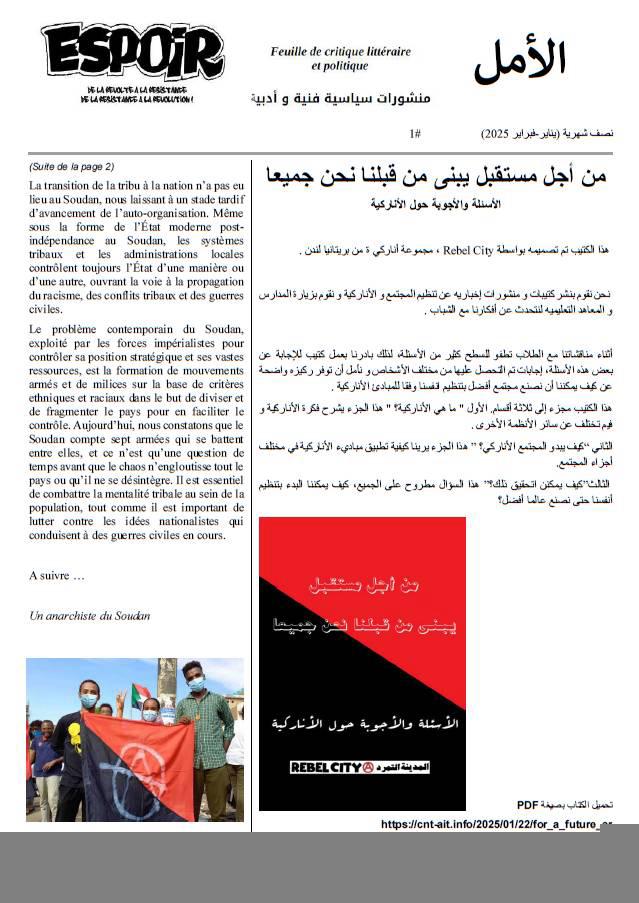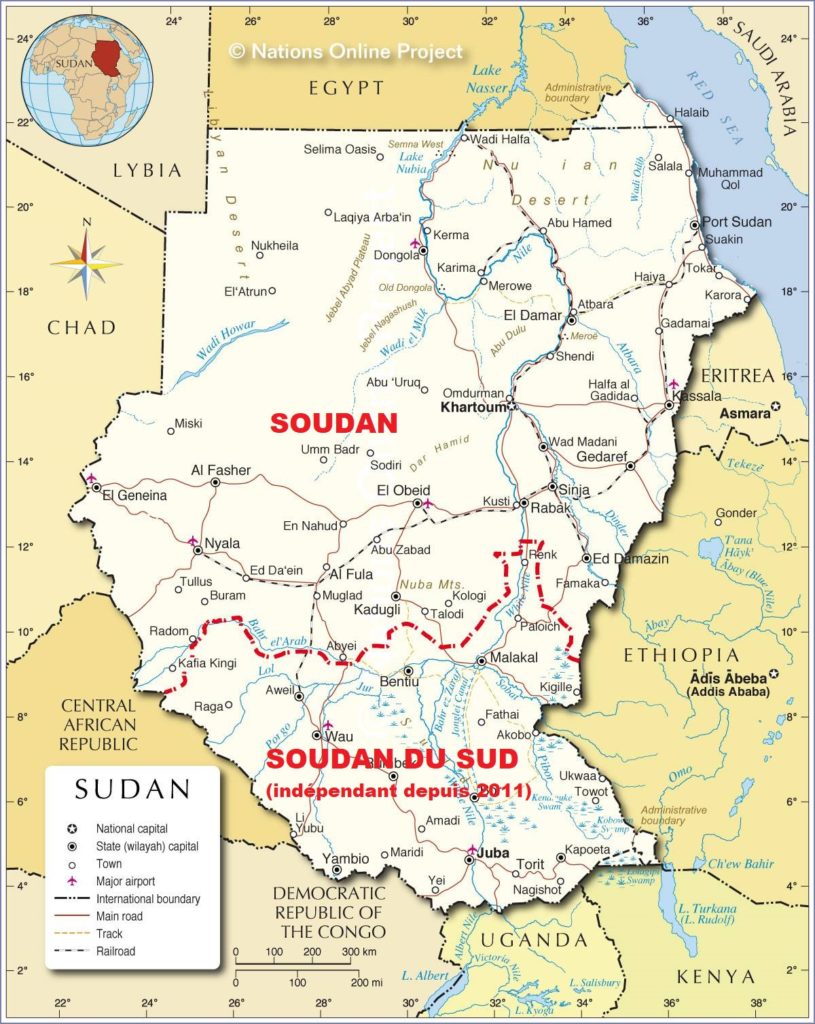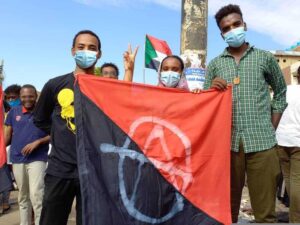Introduction
The dictatorship of the Assad regime collapsed after more than 50 years. Although its downfall appears to be an overnight event, it is a complex result of many contradictions, balance of forces, geopolitical shifts and Syrian people’s struggle for freedom.
There is much to be said about what happened before, during and after the collapse of the Assad regime. This is a vast field of research and many narratives that should be covered by larger amount of literature. In this brochure we will focus on analysing the events which transpired during and after the demise of the regime. You are reading a result of summarizing the updates and analysis produced by Anarchist comrades on the ground in Northeastern Syria. We have taken our place in defense of the revolution and manage to regularly share our perspectives on what we see happening.
As we are writing this, the February 8th comes close and marks two months since the fall of dictatorship. We take this opportunity to summarize our work into a more coherent analytical overview.
The near future in front of us is uncertain. Many possibilities exist, covered with fog of uncertainty. Many people in Syria want peace, but the air if full with tension and anticipation of war. There are doubts whether another option exists, other than standing to defend the revolutionary gains against all odds and against all authoritarian powers around. Peaceful agreements and diplomatic solutions are hard to believe when it comes to states. Everyone pursues their interests. And peoples of Northeast Syria will pursue their interests, too — revolution must be defended. Otherwise — no justice, no peace, no free life. We will continue our struggle here, and we are ready to take our humble place in whatever is about to come.
Revolutionary greetings from your Anarchist comrades in NES, February 2025
01/12/24 What is going on on Syria?
This is a fast update on the situation on Syria to share with comrades, since things are really getting wild. We share mostly facts, political analysis not in this message.
These notes can be confusing for those not familiar with the situation here, feel free to ask!
-
Few days ago the ‘rebels’ of Idlib and surroundings, under military leadership of HTS (a new name of what once was al-Qaeda in Syria) started a big offensive, breaking the siege of the SAA (Syrian Arab Army). The offensive broke throw their lines and started to advance to Aleppo (second biggest city of Syria). They are advancing fast and in multiple directions.
-
Today the offensive goes on, taking control of big part of Aleppo city, with exception of some pockets under regime control and the northern Kurdish neighborhood of Sheik Makhsud.
-
SDF (Syrian Democratic Forces) made a big deployment in reaction to the threats, taking control of the road connecting Aleppo to Raqqa, also connecting with the region of Tal Rifat, where refugee camps for Afrin IDP where at risk of invasion by SNA.
-
SNA (Syrian National Army, proxy of Turkey in Syria) also started an offensive, probably in coordination with HTS, and there are now clashes between SDF and SNA in the Raqqa-Aleppo road. For now those clashes are small, not comparable with the massive offensive of HTS against SAA.
-
HTS is already attacking Sheik Mahksud in Aleppo, after most of the city fell under their control with SAA being overrun and withdrawing in mass. Kurdish forces are fighting back, ready to defend their ground.
-
As for now, the ‘rebels’ also reached the city center of Hama and some northern areas of Homs. Seems there are also clashes in Damascus. There are rumors of a coup taking place, seem that some national television went off air after some (still confusing) clashes.
-
Other ‘rebel’ forces that were trained by US in al-Tanf (South Syria) are also moving, not clear where or why.
-
Iranian forces (very present together with SAA) are being captured or expelled. Iran says this is a coup of Israel-Turkey-US. Diplomatic envoy of Iran will go to Turkey on Monday to discuss situation
-
Since the beginning of the offensive Russia has been moving troops, leaving their ground positions in Tal Rifat (Kurdish areas)
-
As for now, seems clear that the SAA collapsed, ‘rebels’ are taking positions in several big cities and rumors that entire brigades are deserting defecting to the “rebels”. The situation is confusing and shifting.
-
Iraq decided to close down borders with Syria, a lot of diplomatic talks and speculative journalism ongoing. Besides Iran there is a surprising radio silence. – Turkey is not saying much for now, neither Russia who just fired their general command of Syria.
-
NES (North East Syria, aka Rojava) is in the middle of all this, trying to defend the advances of the revolution and specially the Kurdish people of Afrin and Sheik Mehksud. SDF reacted very fast to the threats, seizing the road and avoiding the surrounding of Kurdish areas on this offensive. Is not clear how much HTS and SNA working together or they just started coordinated offensive, also not clear the role of ‘southern rebels’ trained by US. SDF have a defensive position, but taking control of some territories as SAA withdraw.
It’s messy, it’s confusing, it’s not clear what is going on. We will see how things develop. There are more things we could say but this message is already to long so I’ll stop here.
Revolutionary greetings!
02/12/24 What does it mean? Some bullet-points analyizing the situation
-
In the first days of HTS offensive and SNA push against Şehba, as well as siege of Sheikh Maqsood, it is clear that Assad regime is in very difficult situation and it’s collapse seems possible. However, potential HTS rule will not be stable and will not resolve crucial issues of Syria that were created and fueled by the dictatorship of Bashar Al-Assad. Nevertheless, the fall of Assad might open a glimpse of chance for changes in the region, if Syrians – those in the country and those who will decide to come back after exile – will manage to claim original ideas of Syrian revolution.
-
Major geopolitical forces such as Turkey, U.S. and Israel will benefit from offensive of HTS. HTS fits everyone as a force that is opposed to Iran, Assad and Russia. Given a chance to take up state-making in case of success and follow Taliban model, it is possible that main actors will exercise their influence in a possible future new government. It is possible that these states might give support to HTS, but are not interested in Syrian peoples independently deciding for themselves.
-
Fall of Assad regime will be good for DAANES in various aspects, but poses major questions: A) Threat of ISIS taking up the opportunity and growing again while not having to fight Russia and Assad, although they will fight with HTS, B) Growing interference by U.S. in case of increased dependence on their protection against potential Turkish invasion, C) Finding new balance of forces in the region, D)Turkey expanding its direct control far deeper into Syria, and E) Religious fundamentalists of HTS taking over will bring sharp conflict with development and revolutionary achievements of society in NE Syria, first and foremost of women.
-
Situation for Lebanon will be very difficult, as the country will be sandwiched between Israel and HTS-run part of Syria, and might create ground for escalation of internal conflicts. Hezbollah will be left without support from Iran.
-
DAANES is offering a non-state solution based on self-governance, cultural, religious, gender and ethnical autonomy. Still, it gets the least recognition and international support.
Revolutionary greetings!
06/12/24 The regime is collapsing
It is clear that no one have any faith in Assad government anymore. We feel confident to announce that this is the end of the regime. For many Syrians today will be a day of celebration. After almost 13 years of war, misery and exile, their dreams of a Syria without Bashar are coming true. In that sense, it is a day of celebration for us too.
But the end of the regime will probably be just the beginning of a new phase of conflict and instability, a very difficult one. Syria have become a ground for many military forces (state forces and non-state forces) to use violence and war to pursue their objectives without fear for the consequences. From the brutality of the Syrian regime and Russian mass bombings of civilian population, the inhumane and horrific massacres of the Islamic State or the genocidal and imperialist occupations of the Turkish Army and it’s proxies against the Kurdish people and the Rojava Revolution.
More than a decade of war and suffering left wounds that won’t heal with the end of the Assad dynasty, and the following day will probably witness more bloodshed and atrocities. The declarations of SNA operation against Manbij will probably be the beginning of a brutal war of occupation as we already saw in 2018 in Afrin and 2019 in Serekaniye and Gire Spi. The future of Damascus still unclear, and the authoritarian Islamism of HTS will soon start to show it’s dark faces to the Syrian people, the faces that are not screened in CNN but that the people of Idlib, who had been protesting against their authoritarian rule for months, has been suffering and protesting against.
Western powers will tacitly accept (and maybe even support) this mediatic and apparently diluted version of salafism, as they already did in Afghanistan. And those big moves will partly silence the massacres of Turkey in Manbij, letting the rouge NATO partner of middle east a bit lose in exchange for their loyalty in other affairs that are of higher priority for western agenda.
Anyway, this is already too long. If you made it here probably you have opinion on your own about the situation. And maybe now is not a time for words, but a time for action. The revolution in Rojava is, as always, under threat. Let’s celebrate the fall of the regime, but let’s keep building the new world we carry in our hearts.
Revolutionary greetings!
09/12/24 Attacks on Manbij, but SDF is not SAA.
There are too many things ongoing in Syria, the developments are extraordinarily fast – and probably confusing for those not familiar with the situation. Every part of the conflict is racing to position themselves and get advantage from the political transition that will follow in Syria.
Regarding the situation in NES, the resistance in Manbij is critical. A collapse of the SDF in Manbij would had been followed by further attack of SNA, but the military proficiency displayed has been the best deterrence for further movements of SNA. It showed that SDF is not the SAA, and that blietzkrieg tactics of rushing with armored vehicles under artillery fire cover can send regime soldiers running away, but SDF is ready to hold positions and fight back.
For Turkey, Manbij is also very important, and it will be a decisive battle for the future of the SDF and the DAANES. This battle is proving that a well trained and prepared force, even if lightly equipped, can inflict massive losses to a much more numerous and well equipped force, even when they have total air supremacy. Every day that SDF holds any ground in Manbij is one more day that Turkey is being defeated, making SNA looking weaker. HTS took several big cities in days, SNA can’t take one middle sized city even when having full support of Turkish airforce. But of course, as we said at the beginning, SDF is not SAA.
The attacks of Israel can also open new cans of worms, igniting old hates and legitimizing more extreme and fundamentalist positions inside HTS, overwhelming the moderate face that they had been working to present.
Many more things could be say, but this is already getting long so we stop here for today.
Revolutionary greetings!
10/12/24 Turkey on the north, Israel on the south
The withdraw of SDF from Manbij is a painful concession. Many comrades lost their lives in the liberation of Manbij from the hands of ISIS, including the brave arab commander of YPG Abu Leila, also 8 internationalist fighters. As Erdogan stated many times, their next target is now Kobane, the proud city that became the turning point on the war against ISIS through and historic resistance. Kobane was also a key element for the internationalization of the Rojava revolution and the Kurdish question, becoming a symbol of resistance known to the whole world.
The dimension of Israel attack all over Syria is not just a deterrence action against the possibility of a hostile Syria, it is also a show of force a military capabilities to neighboring countries. It is also the perfect scenario for IDF to test their response capacity and air force at such a big scale, without fear of any repercussions since there is no one in Syria able to answer to such brutal attacks.
Turkey’s propaganda campaigns, with miss information and fabricated videos, aims to weaken SDF and destabilize the DAANES. Now they also try to spark intra-Kurdish conflict, harvesting the investments they made for decades in the Barzani-led KRG, using all tools at their hands in this war. Even HTS is calling attention to that, publishing a press statement denouncing SNA’s fabrication of fake videos. But exposing their dirty methods is not enough to stop them, we need to take action in all fronts possible to put an end to their atrocities.
Syria is moving from the joy and celebrations after the fall of the regime, to the darkest hours it lived since the worst times of the war. Israel and Turkey are committing massacres and abusing their power to impose their agendas, taking advantage of the situation to feed their greed and expansionist ambitions. The revolution is under existential threat, and it is our duty, as internationalists and as revolutionaries, to make sure they can’t break this revolution. The world is descending into really dark paths, with war and oppression gaining ground all around. But there is also hope and revolutionary opportunities in those situations. It is partly in our hands to decide where we go from this point.
Revolutionary greetings!
11/12/24 The rush for influence on a new Syria
HTS is now busy making itself more presentable to western audiences, hoping to gain official legitimacy throw capturing the Syrian state structure. Western powers are going along with that, and no one is putting much attention to the small scale attacks that their rogue islamist groups are doing. The DAANES is holding talks with them, accepting them as provisional government for now, hoping to halt Turkish offensive and work towards a federal Syria that respects regional autonomy.
Turkey is moving further in their attacks, striking as far as Raqqa, making a bold statement that they are ready to defy US red lines in order to achieve their aims. The SNA soldiers are recording and spreading videos of the horrendous crimes they are committing as part of their psychological warfare, evoking the behavior of ISIS. This is not a coincidence, several ISIS fighters have been reported to be now holding command positions inside different factions of SNA.
Israel is moving further into Syria, defying even the UN that called to not push forward. With Russia and Iran losing all their influence on Syria, Israel and Turkey (strategic NATO allies, Turkey being formal member of the military alliance) are taking advantage of the situation to advance their imperialist agendas, indirectly supporting each other in their occupations.
DAANES is struggling to sustain the developments of past years, with Turkey attacks on Euphrates region and inter-tribal tensions in Deir-Ezzor, where some tribes pleading alliances with HTS while others reaffirm their support to SDF. This is nothing new, is the continuation of the tribal conflicts that had been ongoing in the region for some time.
One important topic to put attention is the situation of women. Women played very important roles all along Syria since the first uprisings of 2011, but in HTS protests and events, the absence of women is very noticeable, specially when compared with the role of women in DAANES. Rojava is a women revolution, and this is becoming even more obvious now, when all other forces are overwhelmingly male.
Enough for today, keep struggling and support the revolution!
Revolutionary greetings!
12/12/24 Disinformation and ethnic conflicts
The situation is getting very confusing on the ground, with disinformation spreading on social networks and political talks behind closed doors. Verifying information is becoming a critical step to understand what is happening, since Turkish propaganda strategy relays on a very strong disinformation apparatus.
This specially affect a lot of Syrian returnees, since many of them had been living in Turkey and being exposed to the Turkish narrative of criminalization of SDF. This will feed ethnical tensions between Kurds an Arabs, risking more conflicts and even violence.
This comes together with the inter-Kurdish conflicts we discussed two days ago, and indicates a general plan of turkish state intelligence to divide and isolate the leading forces of the revolution. Other forces like US or HTS will not oppose to such a plan, since a weakened revolutionary force will make it easier to dilute and manipulate the political project of the DAANES. This puts the achievements of the revolution in serious danger, and is more important than ever to expose and denounce such strategies, building a common revolutionary front to face enemy attacks.
Revolutionary greetings!
14/12/24 Context on the ceasefire disagreements about a tomb
Short explanation Written by YPG/YPJ International:
The tomb of Suleyman Shah
Part of the negotiated ceasefire between #SDF and #Turkey was connected to the location of the tomb of Suleyman Shah and its military implications. Let’s dive into this a little deeper to understand what this is all about:
Suleyman Shah lived in 13th century and, according to Ottoman legacy, is the grandfather of Osman I, who founded the Ottoman Empire. Because todays #Turkey likes to see itself as successor of the Ottoman Empire, the tomb and remains are important for them.
The tomb of Suleyman Shah was Turkey’s only foreign enclave, located more or less 30km from the Turkish border close to Qere Qozaq, on the river banks of Euphrates. In 2014 the tomb and its 38 Turkish guards, were completely surrounded by #ISIS.
So the tomb was brought to Ashme village, between #Kobane and Euphrates river, a site closer to the Turkish border, where it was easier and less risky to protect, but still on Syrian (and #SDF) territory. Turkey stressed that the relocation would only be temporarily.
While now negotiating the ceasefire, it was offered to help transfer the tomb again, but #Turkey instead requested that it will be given 1km of land in this area, where they intend to deploy heavy weapons and build a military base. Thus no agreement could be reached.
Revolutionary greetings!
16/12/24 10 points of NES diplomacy
The Autonomous Administration of NES has proposed 10 points to start a political dialogue with the provisional government:
10 point proposal of NES
“Cooperation between the governments of NES and Damascus would be to the advantage of everyone in Syria and could help overcome the current difficulties.”
-
First of all, it is important to maintain the unity and sovereignty of the Syrian state and to protect the country from attacks by the Turkish state and its supporters.
-
Military operations on the entire Syrian territory should be ended to start a comprehensive and constructive national dialogue.
-
We appeal to all sides, to refrain from rhetoric of hatred and betrayal to pave the way for a constructive dialogue. Syria is a country that is rich in many ways. This wealth must be preserved, based on justice and democracy.
-
We suggest an early meeting of the Syrian political actor: inside in Damascus to standardize the visions for the transition phase.
-
We would like to work for women to participate even more in the political process than before.
-
We emphasize that resources and economic wealth should be distributed fairly between all Syrian regions, since they belong to all citizens of the Syria.
-
We would like to work to ensure that the original and violently displaced population can return to their areas. It is important to us to preserve their cultural heritage and to end the policies of demographic change.
-
In view of the developments in Syria, we reaffirm our commitment in the fight against terrorism to prevent the return of IS terrorists, through the joint cooperation between SDF and the international anti-IS coalition.
-
We are of the firm believe that the occupation must be ended. The Syrian people must be given the opportunity to determine their future and use the principle of the good neighborhood.
-
We welcome the constructive role of the Arab states, the United Nations, the International Anti-IS coalition and all active international actors and ask everyone to take on a positive and effective role in the advice and support of the Syrian people. And to facilitate the communication between the different population groups in order to ensure stability and security and stop foreign interventions.”
16/12/24 HTS and international fascism
We can see how EU and US are not concerned with the past of HTS as a branch of Al- Qaeda, accepting their provisional government very fast. At the same time very little support or recognition has been given to NES, even when has been the main force on the ground fighting ISIS. Clearly the deciding factors for western powers are not human rights, ethical values and democracy as they like to claim, their decisions are being guided by anti-refugee sentiments and economical interests on oil and gas.
As right-wing parties take more power in governments, their electoral promises of harder migration laws guide their political programs. Those governments end up supporting authoritarian regimes that promise order and stability, hoping they will keep refugees away from their borders, when its exactly those regimes that force people to flee. There is a long history of western powers, especially US, supporting religious fundamentalist groups over socialist revolutionary forces. This goes against ethnic and religious minorities and especially against women and queers, since religious fundamentalism and patriarchy always go hand in hand.
A German organisation called GfbV (society for threatened peoples) warned: “The new rulers of Syria are presenting themselves in the media as moderate, but there are already many signs that they are not keeping their promises. (…) Turkish ruler Erdoğan has already sent his foreign minister to Damascus to torpedo a peaceful solution between HTS and DANNES. Erdoğan’s policy is extremely dangerous. The German government, especially the Federal Foreign Office, must not rely on Erdoğan and the Syrian Islamists if it really wants to create stability and a long-term peace order”
We see that the liberal left seems more aware of the situation, but they are not gonna risk anything to stop it. As it already happened with ISIS, there are threats that won’t be stopped with political diplomacy and economic sanctions. Fascism can have many colors, and it is always in deeply militarized and patriarchal environments where it thrives the best. Religious fundamentalism is therefore a perfect ground for fascism in the Middle East, as islamophobia and racist nationalism is in western territories.
Fascism needs to be stopped before it’s to late. Even if having different colors, authoritarian forces will eventually cooperate to eradicate autonomy and diversity. The mentality of dominant male, imposing their hegemony and dreaming of bigger and bigger nation-states under their rule, is the main threat for any expression of free life. But denouncing it is not enough, we have to take action to make sure their ambitions are prevented. And if not you, who? If not now, when?
One solution. Revolution. Revolutionary greetings!
18/12/24 Rojhilat Efrin on attacks against women
The General Commander of YPJ Rojhilat Efrîn highlighted the ongoing resistance against foreign occupation and stressed the significance of safeguarding the region’s autonomy and women’s rights. She noted that the Middle East is being redesigned, with paramilitary groups and factions contributing to insecurity. The attacks against women symbolize the broader destabilization of society. The importance of international backing for the region’s self-management system is seen as vital for the Kurdish, Arab, and broader regional populations.
Revolutionary greetings!
20/12/24 The dark sides of a new government
The assassination of two Kurdish journalists is a painful reminder of how news and information is a weapon of war.
We are seeing elaborate schemes in social networks, where fake information and fabricated war headlines are propagated, distorting reality and creating confusion about the situation on the ground. This is part of psychological warfare, another form of waging war employed by our enemies. This broadcast channel is partly an answer to it. We know that war has many sides, and that we need to give collective answers to all of them, building mechanisms of self-defense against all kinds of attacks. We also see attacks against health workers, with an ambulance that was transporting injured recently being targeted in the Kobane region. These kinds of attacks are not just attacks against civilians, are attacks against basic ethical standards.
Western powers like to claim a moral high ground, talking about democracy and human rights. Turkey is a NATO member that has been spitting on any basic ethical standards, and still got a new bribe of 1 billion E in the form of aid to control refugees. HTS was on the terrorist lists for its links with Al-Qaeda. But now, climbing the ladder to the top of a Nation-State, that is not relevant for the other heads of State anymore. As it already happened with the Taliban.
It deeply reflects how States are born, with brutal and murderous gangs fighting and killing, until one big man manages to establish himself as president, as king, or even as god. And then the other big men around him applause and congratulate his ascend. After that, maybe they put some make-up and rewrite the history here and there, to make sure it suits whatever is the current trend in present literature. And, voila! A new government is born.
It is also pathetic to see Turkey and Israel building tensions, accusing each other of the same crimes they are committing themselves. Especially when their military intelligence agencies collaborate and negotiate the occupation and partition of Syria behind the cameras.
“The Truth will not remain captive in the darkness”
Comrade Nazim, comrade Cihan, all the brave fighters defending this revolution: Rest in Power!
Revolutionary greetings!
22/12/24 Diplomacy and the 4D chess
Very fast, al-Julani traded his military-style green shirt for a business-style black suit and a tie, hosting several official meetings this Sunday in the Syrian presidential palace. A new technocrat is born, paving his way to the presidency of Syria and to the corridors of the international Realpolitik.
This creates a very challenging situation for the DAANES, since it is the game that Kurdish politicians had been trying to play for the last years. Diplomatic institutions had become an important work for the bodies of the self-administration, moderating the revolutionary narrative to look formal and acceptable to western audiences, aiming to achieve recognition and status for North-East Syria. It worked for a while, creating an illusion that office politics and diplomacy was the right path to follow. But now this illusion is vanishing.
The negotiations of Mazlum Abdi for a ceasefire in Kobane, proposing a demilitarized zone, rightly addressed the concerns that Turkey was putting on the table about the tomb of Suleiman Shah. This exposed the hypocrisy of AKP, that was just using those conditions as an excuse for their attacks. But with US entering the game, and especially with the fierce resistance of SDF in Tishreen and Qereqozah, the invasion got halted for now. SDF is crushing wave after wave of the mercenaries that Erdogan is sending.
Erdogan has hopes that Trump will side with him when he takes office, but the pro- Kurdish positions from some senators of the republican party -with a the bipartisan bill against Erdogan proposed in the US senate- are now bringing doubts about that. Kurdish diplomacy has been playing a pivotal role in the last years, and the revolutionary process also paid a price for it, having to play the role that western powers (mainly US) wanted to see “the Kurdish partners” playing.
But the Kurdish liberation movement is more than the diplomacy of Rojava, and the resistance in Kobane is proof of that. We made it that far because the people of Rojava have always been ready to fight and defend their land. If we want to push for revolutionary transformations, we need to take initiative and go on the offensive.
Revolutionary greetings!
23/12/24 Pushing back in Manbij countryside
The SDF seized the opportunity and are making an advance towards Manbij. Since SDF kicked out ISIS in 2016, Manbij had years of democracy and stability. Now we see how the local population refuse to accept the Turkish occupation and the violent fundamentalists groups of SNA. We can see how the self administrations managed to get the vast majority of the people behind the idea of this revolution.
This is a very important victory, not just for the military aspect but also on the political side. Pushing back against the occupation is also a psychological blow for the Turkish proxy groups, that find themselves in disarray in front of the advance of SDF. Phones and other devices captured in the advance of SDF are now showing their communications, where desperate calls for help and scared communications of fighters running away are being circulated in whatsapp groups. Their dependency on Turkish military power makes them vulnerable to SDF counter attacks, because they don’t have contingency plans for those situations.
Still, Turkish air superiority is a massive challenge for SDF advance. Advances towards Manbij are a big achievement, and we should celebrate it. But the war is not over, Turkish planes can become a nightmare not just for SDF but for all peoples of northern Syria. It is still not clear how much Erdogan will try to play political in his alliance with HTS, or how much he will go full on with military attacks.
But this will be something we will need to evaluate in the future, today let’s ceebrate this amazing victory of SDF!
Revolutionary greetings!
24/12/24 The dark side of a new government II
HTS is consolidating their power, announcing the disarmament of different factions and their integration into a new national army, under control of the provisional ministry of defense. The provisional government is also making concessions with Christian communities, that organized big protests in Damascus after the arson attack on a Christmas tree in Hama. It looks a bit weird for us to see their demonstrations, marching and holding crosses above their heads, playing with the hegemony of Christianity of western powers as a tool of deterrence.
Anyway, it worked. Ahmed al-Sharaa announced that those who burned the tree were not Syrians, and that there is no place in the new Syria for them. He learned fast to speak the language on western nation-states, using racism and xenophobia to blame the other, to pin any crimes and problems on some external threat, closing ranks under one flag, one nation, one state. But it really seems that those who burned the tree where not Syrians, but Chechens, Islamist veterans that were counted among the elite fighters of the now dispersed al-Nusra front. As Mussolini did one century ago, when he dumped his loyal ‘fascio di combatimento’ paramilitaries once he got to the Italian parliament, al-Sharaa is now purging the ranks of HTS to consolidate his power.
But let’s not get lost in history. The important news for us are happening here, next to the Eufrates river. The counter-offensive on Manbij yesterday night had been an important victory, redefining the dynamics of the SNA-SDF ongoing conflict. It proved that SNA stands no chance against SDF without Turkish drones in the sky. It also means that, from now on, every time it rains, SNA mercenaries will be exposed to new SDF counter- offensives.
For those who had been in Rojava for some time, we remember how the Turkish offensives of 2018 and 2019 advanced ruthlessly to fulfil their aims (first Afrin, later Serekaniye and Gire Spi). Back then, they had green light of Russia and US to do as they wanted. Now, with Russia absent and US waiting for Trump to return to the white house, there is a window of opportunity where SDF can use the rainy days to push back. The first counter- offensive in Manbij has been a success, not just on a military level but also on a psychological level, showing that the revolutionary forces are ready to defend their land. This has sent a clear message: Kobane is a red line. If anyone mess with it, the spirit of the resistance that broke the advance of ISIS will once again burst free!
Revolutionary greetings!
25/12/24 Alawite tensions and SNA defections
There are now big protests in the main cities of Tartus and Latakia, reacting to the desecration of the tomb of an important Alawite scholar. This adds to videos that had been circulating on social networks, where HTS fighters are threatening and insulting Alawites in rural areas. Also in Hama and Homs big protests are ongoing, with rumors spreading of HTS opening fire against protesters. This can become a big challenge for the provisional government, since the stronghold of the old regime minority (the Alawites) can easily spark clashes and old hates, with HTS acting on old grudges and spite against them. Seems that SNA is now being deployed on Latakia too, and they will just add gasoline to the fire. This adds difficulties to HTS, that more or less managed to calm down the protests of Christians in Damascus for now, knowing that those are closely watched by western christian powers, even more on Christmas days.
Today there was also big confusion with a statement attributed to SDF, that was announced by Kurdish media but not visible on any SDF channels. The alleged statement called for armed groups in Serekaniye and Gire Spi to surrender their weapons, to abandon their positions and leave occupied territories, offering safe passage to other areas if they withdraw before the end of the year. Most Kurdish media removed the statement, but still the news circulated. On the ground no one knows anything about such plans. Still, after the success of the Manbij counter-attack, liberating Serekaniye is something that everyone is talking about.
Revolutionary greetings!
28/12/24 On minorities unrest and the need of a ‘democratic nation’ project
After a month since the offensive of HTS started, we have now better ground to evaluate what is going on in Syria. The unexpected collapse of al-Assad regime was followed by celebrations and hopeful dreams of an easy and bloodless transition in Syria. But this is something we only see in movies and history books. In real life most revolutions are followed by periods of instability and warlordism, where different factions struggle to impose their hegemony.
The recent protests of Christians, as well as the uprisings of Alawites, are complex events that are getting polarized in social networks. These two social groups had certain privileges during the regime of al-Assad, privileges that were partly established with the old French colonial rule, favoring them over Sunni Arabs or Kurds. But those privileges are also limited to some higher classes, and not all members of those groups were aligned with the regime.
Those uprisings are not simply “uncontrolled regime/Iran/Israel elements/agents” as HTS like to claim, it is also a reaction to the attacks of “uncontrolled HTS elements”, like the fire on the Christmas tree in Hama and the desecration of the grave of an important Alawite scholar. Those attacks are manifestations of ethnic grudges that many Sunni Arabs may share, but when ethnic simplifications like this are used to call for ethnic cleansing, things can very easily spiral out of control.
Many Alawites and Christians had power positions in the regime, but many Sunni Arabs too. Kurds know very well what it means to be part of a secondary class, to be at the bottom of the social pyramid. That’s why it has been so important for the DAANES to develop respectful and inclusive methods for everyone, allowing autonomy and self- organization to all different social groups. HTS sectarian visions, with Islamic fundamentalism as a ground to build a fake national unity, pose serious threats to the diversity of Syria.
The DAANES is already making calls to stop the attacks against Alawite people, to put an end to the sectarian violence, to build the nation under a base of diversity and respect for the other. The call for a “democratic nation project” should be understood in that sense, as part of a wider project for democratic confederalism, questioning old patterns of tribalism, patriarchy and nation-state. It is a call to continue the revolution all around Syria and beyond.
Revolutionary greetings!
29/12/24 Diplomacy and the 4D chess II
Any hopes of a tolerant and progressive government under HTS are rapidly dying. The military repression against Alawites has been just a glimpse of what is coming. After yesterdays call of the UN envoy for elections in 3 months, al-Sharaa responded today that no elections will take place in Syria in the next 4 years. He also announced his plans for the dissolution of HTS during the National Dialog Conference. That probably means to dissolve it inside the structures of a new centralized government, attempting to wash off the terrorist label that still hangs on HTS, while institutionalizing and taking control of a new Syrian state. In short, achieving a transition from Party to State, as any authoritarian force attempts to do.
We also include some words from Hawzhin Azeez, a Kurdish political academic who shared her reflections about the rumors of dissolution of SDF and the importance of YPJ:
It’s a mistake to see the YPJ as solely a response to end ISIS terrorism or an integral aspect of Kurdish national liberation. The YPJ are a permanent military force that will only dissolve itself when capitalist, statist and patriarchal oppression ends. They are ideologically committed to protecting women and themselves so long as these hierarchies of oppression and violence against women exist. They are a permanent women’s self protection unit here to stay. Even if the HTS/Jolani government manoeuvres the disarming of the SDF somehow, the YPJ is ideologically committed to permanent self protection even against the men/forces in their own communities. They cannot be dissolved! The YPJ is one of the most radical and groundbreaking aspects of Rojava’s Revolution.
Revolutionary greetings!
30/12/24 War is politics with effusion of blood
Today a pentagon official declared that the ceasefire between SDF and Turkey is holding. It’s surreal to read those declarations when heavy clashes are happening everyday around Manbij. Ahmed Al-Sharaa keeps receiving visits of foreign diplomats to gain legitimacy as negotiations are still ongoing. Mazlum Abdi affirms the will of SDF to become part of the new Syrian army if an acceptable agreement can be reached. And ISIS continues attacking security checkpoints in several areas of Syria.
The attacks yesterday of the Military Council of Serekaniye in the Turkish occupied areas were a good reminder of two things: 1) Many parts of Syria are still under occupation, and people are ready to fight to liberate their homes 2) SDF is probably the strongest military force on the ground. It is important to remember those things when we look at the negotiations between SDF and HTS. Any call for a new Syrian army needs to include SDF, and SDF will not accept to simply “give up the weapons”. SDF is currently protecting about a third of the Syrian territory, with a well grounded and coordinated force. Together with many local military councils, SDF also counts with special elite units, veterans of the war against ISIS. HTS surprised the world with their production and proficiency with kamikaze drones, and counts in their ranks with some veteran Islamist fighters. Still, HTS can’t defeat SDF on the ground, at least not without the Turkish support that is allowing the SNA to attack the SDF.
Another thing to keep in mind is that, after many years of silence, Syrians are now free to discuss politics openly in the street. Years of fear and repression from the regime secret services are now behind. Damascus, Aleppo, Homs… those are historical cities with vibrant new dynamics, that also carry important lessons from the years of resistance against the regime. Many politically organized Syrians are now in exile, but still many voices are already challenging the authoritarian moves of al-Sharaa. We also saw how Damascus was not liberated by HTS, in fact they arrived to the capital when Assad was already gone. The first military barracks stormed in the capital where the southern ones, with Druze flags and FSA brigades emblems. Those were welcomed by the people of the capital, that celebrated their arrival because they also wanted the regime out. So when tomorrow HTS starts to claim that they are the ones that saved Syria, remember that they are lying. It was the people who toppled down the regime.
Revolutionary greetings!
02/01/25 Politics is war without effusion of blood
We start 2025 with many things going on. January will be a challenging month, with a race of different actors to strengthen their positions, both in the military field as well as in diplomatic influence. Al-Sharaa is putting his HTS trusted circles in key positions in the government. You can read some of their (newly collected) biographies on Wikipedia, partly documenting their past activities as “brave jihadist fighters” of al-Nusra. How much they are just playing a theater for western audiences, or how much they really moderated themselves in exchange for power in a Nation-State, is something that will be more clear in the next months.
The statements of an insurgent “popular resistance movement”, with a certain Iranian flavor and with Russian fringe media echoing it, can contribute to new waves of instability if they come backed up with actions. The Druze community in the south also seems unwilling to cooperate with HTS transitional government, contributing to a mosaic of actors that question HTS’ proclaimed power. Meanwhile, many people in Syria’s western cities are going out to the streets, fixing roads and painting murals, reinforcing bonds of solidarity and mutual aid among neighbors. This networks of civic organizing can easily flourish in local committees and popular councils, as they already did in the early years of the Syrian revolution. How much HTS government will give space to these local initiatives, and how much these grassroots movements will confront the authoritarian steps of HTS, is something that will be a determinant for the future of Syria.
The press statement of the ‘joint forces’ leaving the SNA coalition is an important step, moving towards a generalized meltdown of the Turkish proxy forces. It is not clear how much it is an open defection or maybe a ‘cover’ operation of Turkish intelligence, aiming to ‘infiltrate’ some of their trusted agents in the new Syrian Army. Still, together with many local reports of groups and fighters defecting to go back home, plus the big amount of losses that the resistance of SDF is inflicting against their attacks, all this is making SNA more an more unable to hold their ground. How much Turkey will try to keep SNA together or will try to invade directly if things don’t play as they want remains still to be seen.
On the other side, the ongoing talks to integrate SDF in that same new Syrian Army are an uncomfortable but necessary step, in order to build relations with the transitional government and avoid being outmaneuvered by Turkey. For now, they seem similar of nature to the negotiations with the Assad regime that were held in the past. SDF never reached any agreement with the regime that wouldn’t compromise their integrity and values, and the same is true for the new negotiations with HTS. Negotiations of this kind are diplomatic games, a projection of power of the different actors. If the balance of power changes, negotiations can be pushed in a new direction, with the stronger imposing their will and the other having to accept a compromise. Therefore the most plausible scenario is that those negotiations will get stalled, waiting to solve the differences on the battle field.
Revolutionary greetings!
04/01/25 Negotiations and delegations
The recent handover of strategical border-crossing points in Afrin to HTS is a very relevant development, it shows the will of Turkey to sacrifice SNA militias in exchange for better relations with HTS. Those border crossing points are a big source of tax revenue for the militias that control it, cutting down their access to funds and giving them to HTS will not just improve their economical situation but also reinforce the centralized control that the HTS transitional government is attempting. And of course, Turkey is expecting HTS to not forget that they are helping them with that, gaining a better diplomatic position in future negotiations.
The visit of the French and German foreign ministers to Damascus indicates that Europe is willing to accept the transitional government as legitimate representation of Syria. The video with the awkward moment when Baerbock offers her hand and the reception delegation and they refuse to shake her hand, has been circulating a lot. It is a clear indication of the misogynist approach that this transitional government has. At the same time, they orchestrated a press conference with an unveiled women talking on behalf of the White Helmets, a rescue organization with close ties with HTS and Turkey. This is clearly a move for media spectacle, since any pictures ever seen of women working with White helmets has been always with veil and gloves, and always as having an auxiliary role. This adds to other examples of HTS tokenizing women to appear moderate and aligned with inclusive values, but it is clearly nothing else than a facade.
Revolutionary greetings!
06/01/25 Slowing down the roller coaster
The extreme instability of the last month seems to be slowing down. This is a dangerous time, where the international media attention starts to withdraw, forgetting once again what is happening in Syria. The heavy clashes of Manbij countryside are the new normality, as well as the intensified artillery attacks of Turkish army, as well as the constant drone strikes all over north east Syria. In the big cities of Western Syria the transitional government is tightening their control, with security operations targeting mainly old regime loyalists for now.
The unstable situation of the Kurdish neighborhoods of Sheik Mekhsud and Ashrafia in Aleppo is slowly (but silently) escalating tensions. SNA fighters dropped some explosive devices days ago before being shot by local defense forces. Today, a crowd chanting slogans aligned with the transitional government marched towards the Kurdish neighborhoods. YPG forces fired warning shots in the sky to disperse the march, and for now it stopped there.
The local militias from Suwayda “Men of dignity” and “Mountain brigade” made statements rejecting sectarian factional armies and condemning the deadly clashes that took place recently in the south of Syria. It is not clear to us if the clashes where with HTS supporters (as we reported recently) or with old regime loyalist groups. Or maybe with both, reports seem confusing and our lack of trusted sources from southern Syria makes it difficult to get a good grasp of the situation.
The fatigue and exhaustion after more than a month of frantic activity are also weighing on everyone. In these times we can see the dynamics of war switching from sprint to marathon, where endurance and resilience become critical. Those who can’t withstand the pressure, those who break, will open small windows of opportunity for their enemies. SDF has repeatedly proven its strength in this long term race, so now is time to wait for enemy mistakes. As Sun Tzu wrote 15 centuries ago: “To secure ourselves against defeat lies in our own hands, but the opportunity of defeating the enemy is provided by the enemy himself.”
Revolutionary greetings!
08/01/25 Turkey increase efforts
As SNA weakens, the Turkish army is increasing their role in the Tishreen front lines. Drone strikes are targeting not just military positions, but also SDF supply lines and even the civilian convoy that traveled there. More and more armored vehicles are being supplied to the Turkish proxies, combined with increasing air support from drones and war planes. The resistance of the Tishreen dam is at the moment the warmest front line of all Syria, a decisive battle for the resistance of the DAANES is being fought there.
The reiterated threats of Turkey about a total invasion in Northern Syria are now coming with claims to control ISIS prisons. This could be extremely dangerous, considering how many foreign ISIS fighters could reorganize their cells with Turkish help. Many of them were aided by Turkish state to cross the border to Syria to join ISIS 10 years ago, and Turkey could now use them as leverage to create instability and chaos in many countries.
The Israel “Committee for the Evaluation of the Defense Establishment Budget and the Balance of Power”, led by former National Security Council head Yaakov Nagel, is highlighting the tensions between Israel and Turkey. These two states are competing for hegemony in middle east, and their tensions can become more and more central as both states expand their influence in Syria. How the transitional government balances their occupations (Turkey in the north, Israel in the South) will affect also what role the DAANES and the Kurdish liberation movement will play in Syria.
Revolutionary greetings!
10/01/25 Solving contradictions, creating opportunities
The civilian vigil on Tishreen dam is an example of the readiness of the people in north- east Syria to defend their land, using a wide diversity of tactics. For several years, militants of northern Syria have been discussing the importance of a resistance inspired on the ideas of “revolutionary people’s war”. The ongoing protest in Tishreen, together with the other vigils taking place in the Syrian-Turkish border next to the cities of Qamishlo and Kobane, are an example of civil resistance against occupation. Those actions don’t go in contradiction with the military defense of SDF, instead they complement each other, combining diverse forms of resistance towards a common aim.
The International Coalition is also making some interesting steps, with French army starting to deploy alongside US forces in the border with Turkey and other locations. France has been an important partner of the International Coalition since the beginning, and this is probably related to the fears of French State to foreign ISIS fighters, many of them with French nationality. If HTS or Turkey take control of the prisons currently under control of SDF, that hold thousands of ISIS fighters captive, those prisoners could find their way back to France and endanger the security of many European countries. This is also a preventive move of France, taking precautions before Donald Trump, who declared his intentions to withdraw US soldiers from Syria, takes over the white house.
The Turkish appointed governor of Afrin refused the call of HTS to transfer the management over the local council to an HTS delegation. This reflects how, even if Turkey and HTS are cooperating in many areas, they still have conflicts an power struggles. Those kind of contradictions can evolve to more bitter relations if Turkey refuse to give up control of the regions they occupied in Syria. Contradictions in the relations between Iran and Russia are also surfacing, with declarations of an Iranian commander blaming Russia for not really fighting against the rebel offensive that sparked the collapse of the Regime.
All authoritarian powers, all centralized governments, have always one aim: to accumulate more power. This brings them to cooperate with each other when they can benefit from it, but also to constantly compete and clash against each other. Exploiting these contradictions is necessary to undermine their hegemony. Pushing them to clash on each other can create opportunities for revolutionary forces, but only when those forces are well organized in strong revolutionary movements can really seize those opportunities and develop alternative models against capitalism modernity.
Revolutionary greetings!
13/01/25 Dialog and reconciliations
The preparation for a “national conference” for Syria had been ongoing for some time, but now the announcements are getting more concrete. It is still not clear how this conference will be organized and who will be allowed to take part in it. As details are being clarified, it will become more clear if it is an inclusive and democratic process to engage in a national transition, or if it will be a performative process to legitimize power grab of HTS after the collapse of the Regime.
SDF meetings with HTS continue, and some agreements are being reached as the recently announced joint administrative committees indicate. The diplomatic relations with KRG also continue, suggesting agreements towards Kurdish unity for the future. These diplomatic negotiations are very difficult and fragile, and nothing is concluded yet. Talks about peace and dialog may not sound very radical, but defending the revolutionary achievements of NES is clearly a priority in those talks. Let’s hope for the best, but also let’s get ready for the worst.
Revolutionary greetings!
15/01/25 Moving forward
Now it’s one month and a half since we started to elaborate these reports of curated news, summarizing the ongoing situation in Syria. It has been a very intense and we are very grateful for all support and interest from comrades following this updates. We put a lot of efforts to make sure comrades have access to reliable information about what is happening. As the situation slows down, we also need to catch up with other works we put on hold due to the situation of emergency.
The war stills roaring in Tishreen, and Turkish planes and drones continue their brutal attacks against the people of NES. The bombings on civilian convoys are an extreme example of how far they are willing to go to achieve their aims. The diplomatic talks and other forms of soft power is now the main element, we know the politics are just a continuation of war without blood spilling (as war is a continuation of politics with blood spilling).
For us, this is also a time of action. Not only in the front lines but also on the streets, with popular resistance and grassroots organizing. We want to call you once again to organize commemorations for the Syrian anarchist Omar Aziz, who died in the prison of the al- Assad regime. Wherever you are, you can organize events in solidarity and support the revolution. We hope this can become a ground to build networks of comradeship and mutual aid among anarchist comrades, to support the revolutionary movements in Syria and to question the authoritarian forces that try to impose themselves as new centralized government. Power to the people! power to the local councils and peoples federations! Remember Omar Aziz and all revolutionaries who gave their life for this revolution!
https://rememberomaraziz.net/
Revolutionary greetings!
17/01/25 Dialog and reconciliations II
The meeting between Mazlum Abdi and Masoud Barzani has been celebrated by kurds in cities like Qamishlo. Others look at it with mistrust. Some hope it is the beginning of negotiations towards a process for Kurdish national unity. Together with the meetings of KNK (Kurdish National Council) that recently took place in Qamishlo, we see big efforts from Kurdish political bodies to build national unity and cooperation with the new Damascus administration. This can also bee seen in relation to the recent delegation that visited Abdullah Ocalan in Imrali, that shared a message of dialogue towards peace and stability.
It is the first time that PDK, the ruling party of KRG (Kurdish Regional Government in Iraq), hosts an official delegation from SDF. Besides a brief cooperation in 2012–2013, the relations with PDK and PYD, the main Kurdish political party of north East Syria, had been difficult. PDKs cooperation with Turkey has been a deep contradiction that made any agreements impossible. PDK expanded their activities and influence in some areas of Afrin, under occupation of Turkish proxies. After serious disagreements, the self administration forbid ENKS, a party affiliated with PDK, to continue working in northern Syria. This blockade was lifted some months ago, but the relations still difficult. There are also decades of conflict, even war, between PDK and PKK that will make those negotiations very difficult.
National unity is an important element for any process of national liberation. The promises of a free Kurdistan had been the engine of many Kurdish political parties for several generations, but how this free Kurdistan looks like (and who is ruling it) has been always a point of conflict. The occupation of other nation states of Kurdish land made the creation of a Kurdish state impossible. The proposal of Democratic confederalism moved away from attempts to build a Kurdish state, and instead developed the proposal of democratic nation to build a stateless society. How much this is compatible with current negotiations is something that only time will tell.
Revolutionary greetings!
26/01/25 10 years of the liberation of Kobane and Shibani in Davos
As HTS government consolidates it’s position, asserting their diplomatic influence and expanding their military presence over Syria, their position on the autonomous self- administration starts to be more aggressive. Recent military deployments on the gas and oil fields south of Raqqa were used by some media to claim military advances over SDF, exploiting also ethnic tensions and resentments that may arab nationalists still hold against Kurds. It is not clear how much it was a mistake or disinformation of some media, or how much it was an intentional move to portray the transitional government as strong and decisive against separatism. Assad al-Shibani, FM of the HTS government who recently got his PhD from an Istanbul private university, is calling to disband SDF in the (in)famous World Economic Forum of Davos, while announcing a full embracement of neoliberal economical agenda for Syria.
Al-Sharaa, ‘de facto’ president of Syria, is also making declarations like “The Kurdish People’s Protection Units alone did not respond to our call to restrict weapons to the authorities”. Those statements dismiss not just the ongoing negotiations with SDF, but also how other armed groups also rejected his calls to reorganize the monopoly of violence under direct control of a centralized state. As SDF makes diplomatic moves to consolidate it’s position and strength in the negotiation table, HTS seems to be more inclined to accelerate tensions towards confrontation, knowing they will have full support of Turkey for any military action against SDF. Turkish state media have a long history of fabricated news, and now already twice they spread false information of alleged car bombs going to Aleppo from SDF areas, indicating their readiness to create excuses to justify attacks on SDF.
Let’s not lie, the situation in NES looks difficult. Still, the resistance in Tishreen is an example of the determination to resist against the invasion, to defend the advances of the revolution. We also remember how 10 years ago, 26th of January of 2015, YPG and YPJ announced the liberation of Kobane from the attacks of ISIS. We should not forget that, because at that time it looked much darker than today. And here we are, the revolution did not just defeat the caliphate, but have been also a key element to the collapse of the regime of Bashar al-Assad. It is also making impossible for Turkey to consolidate it’s imperial aspirations in Syria and in Kurdistan. Revolutions are not the easy way, we know that, but difficulties won’t deter us to pursue our dreams of freedom and liberation.
Revolutionary greetings!
26.01.25–01.02.25 On the New Syrian Government’s “Victory Congress”
The Military Operations Administration in Syria announced some dramatic shifts in the country’s governance as results of the so called ‘Victory Congress’. This congress was organized with a high degree of secrecy and was held among military leaders of different factions, including SNA. SDF or DAANES delegates were no invited. The next day Ahmed al-Sharaa gave a public speech on Syria national tv as new president.
Announcements of the “victory congress”:
-
Ahmed al-Sharaa is now the official president of Syria’s transitional phase. The 2012 Syrian constitution is abolished.
-
A temporary legislative council will be established to govern the country until a new constitution is drafted and implemented.
-
All military and security institutions previously loyal to the old regime are officially disbanded
-
All armed factions and political-revolutionary bodies will be dissolved and integrated into state institutions
-
The Ba’ath Party, which had ruled Syria for decades, is officially dissolved
Key priorities for the transitional phase announced in the “president speech”:
-
Establishing a functioning authority to fill the political vacuum.
-
Ensuring civil peace and preventing further internal conflicts.
-
Building state institutions that can serve the Syrian people.
-
Developing a strong economic foundation to drive recovery.
-
Restoring Syria’s international and regional standing.
Major challenges for the new administration:
-
Security threats from remaining militant factions and external actors.
-
Economic hardship, exacerbated by years of war and sanctions.
-
Political divisions within Syrian opposition groups and international stakeholders.
Declaration of the DAANES about the “Victory congress”
As the DAANES, we emphasize that these decisions should have been taken at a ‘National Congress’ with the participation of everyone. In particular, we do not accept the presence of some terrorists who have the blood of the Syrian people on their hands. Ehmed Ihsan Fayad al-Hayis, who brutally murdered Hevrin Xelef, Secretary General of the Future Syria Party and Mohammad al-Jasim, the head of the Abu Amsha group, complicit in many crimes committed in Afrin, were present at this meeting. We emphasize once again that this meeting is not legitimate and does not represent the Syrian people. Any decision to be taken in Syria without a National Congress including all political circles will be incomplete. The most appropriate solution to end the instability in Syria is a national congress. The exclusion or suspension of any party in Syria from the congress will be no different from the practices of the former regime. On this basis, we once again call on the government in Damascus to refrain from such mistakes. Everyone must take part in the making of the new constitution in Syria. As the DAANES, we once again call for the unity of Syria as part of our national liberation perspective. We emphasize once again that everyone in Syria must have their say about the future of Syria.”
